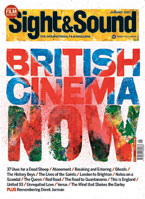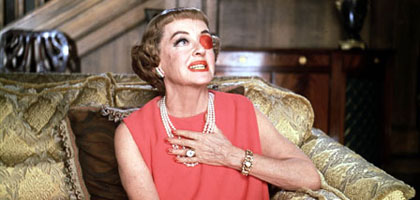Primary navigation


Tim Lucas on a perfect marriage between Bette Davis and UK horror studio Hammer
Roy Ward Baker; UK 1967; Anchor Bay Entertainment/Region 1; Aspect Ratio: 1.85:1; Features: audio commentary with Baker and writer-producer Jimmy Sangster, trailer, TV spot, poster and stills gallery, biographies
Greeted as something of a misfire upon its original release, Hammer's The Anniversary has ripened in the vaults into a volatile cocktail of high style, overwrought melodrama and obsidian comedy. Based on a successful play by Bill MacIlwraith, it's a nearly perfect evening's divertissement for these more savage times. The indomitable Bette Davis, headlining her second and final Hammer production (after 1965's The Nanny), stars as Mrs. Taggart, the one-eyed, acid-tongued matriarch of a family of sons in the construction business, none of whom has learned anything from their parents about building a solid foundation, literal or metaphorical. Yet they all come to honour her on the occasion of what would have been her 40th wedding anniversary. To quote another play, it's going to be a bumpy night: the youngest son (Christian Roberts) brings uninvited the pregnant girl (Elaine Taylor) he is planning to marry; the weakish middle-born (Jack Hedley) and his starchy wife (Sheila Hancock) announce their plans to take the grandchildren and move to Canada, to distance themselves from the old crone; and the eldest (James Cossins) is not only discovered trying on the clothes of the women guests, but also takes advantage of an errand after dark to steal some strangers' undergarments from a clothesline. But Mother Taggart can trump them all for outrageousness, and does so in a marvelously sustained performance by Davis.
An atypical Hammer production, The Anniversary represents an attempt by the formidable horror studio to find their Who's Afraid of Virginia Woolf? or Guess Who's Coming to Dinner? Present in the original, successful 1966 stage production of MacIlwraith's play but not in the film were Mona Washbourne in the lead, Michael Crawford as her youngest son and June Ritchie as the fiancée. The rest of the theatrical troupe won the opportunity to reprise their roles onscreen. These supporting roles are impeccably played; Hedley is an almost touching emotional trainwreck posing as a grown man; Hancock's role takes her through the whole index of human emotion; and, impressively, we're given no opportunity to laugh at Cossins' transvestite, who is given some memorably sober lines about his fetish in a good stand-apart scene with the pert Taylor. The material's dramatic origin is thoroughly apparent in the action being mostly limited to one of the most fabulous, multi-roomed, standing sets seen since Jerry Lewis' 1961 film The Ladies Man; there are only a couple of location scenes. For all the quality apparent in these supportive details, the piece is unquestionably Davis' showboat: dressed in matching red frock, heels and eyepatch, she's the anti-Mame. Acting with only one eye, which appears to burn with twice the usual luminosity, her tart delivery is everything a drag queen might want to imitate or that John Waters might want to direct. Her performance in this theatrical context is, among other things, a lasting monument to what the stage lost when Davis became a movie star.
The Anniversary's arrival on DVD is a much belated, very quiet, but still welcome postscript to Anchor Bay's long-in-progress Hammer Collection. The anamorphic 1.85:1 transfer is unusually crisp for a film of this vintage - perhaps too much so, as it exposes the spots on the fashionable eyepatch through which Davis could see (something of which the film's own producer was unaware) as well as the stepped-up filtering that occurs only during her close-ups. The mono audio track is equally vibrant, making the most of a theme song by the New Vaudeville Band (of Winchester Cathedral fame). A British theatrical trailer and a US TV spot are included, which take different approaches but share a misleading suggestion that Mrs. Taggart is going to be murdered on this special occasion by her fed-up family. A meagre poster and stills gallery reminds us that the film (which ends with the star having a good laugh while figuratively pissing on the audience) carried an early "suggested for mature audiences" card in America.
The audio commentary offers disc producer Perry Martin in conversation with director Roy Ward Baker (Don't Bother to Knock, 1952, A Night to Remember, 1958) and writer-producer Jimmy Sangster. Both men have cut dullish commentaries in the past, but both are appreciably alert here, discussing the production and its place in Hammer's history, the elaborate set, the adaptation of the play and, of course, Davis, who had the film's original director, Alvin Rakoff, fired after ten days. They agree she was the consummate professional, reveal that she took full responsibility for acquiring her wardrobe, and highlight some less obvious aspects of her craft, such as her remarkable ease of facility with props. Unfortunately, the other players are mostly ignored as the talk veers away into Baker's nevertheless interesting memories of assisting Alfred Hitchcock on The Lady Vanishes and his comparisons of working for Hammer and its rival British horror studio Amicus.